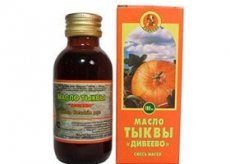Medical expert of the article
New publications
Preparations
Pumpkin seed oil
Last reviewed: 03.07.2025

All iLive content is medically reviewed or fact checked to ensure as much factual accuracy as possible.
We have strict sourcing guidelines and only link to reputable media sites, academic research institutions and, whenever possible, medically peer reviewed studies. Note that the numbers in parentheses ([1], [2], etc.) are clickable links to these studies.
If you feel that any of our content is inaccurate, out-of-date, or otherwise questionable, please select it and press Ctrl + Enter.

Pumpkin oil or pumpkin seed oil (Cucurbita pepo L.) is a natural remedy containing biologically active substances that help in the treatment of a wide range of metabolic pathologies, gastrointestinal tract, liver, blood vessels, skin, as well as some infectious and inflammatory diseases.
Some manufacturers classify pumpkin oil as a hypolipidemic and anti-sclerotic agent (reducing the level of lipids and cholesterol in the blood), while others classify it as an antiulcer, hepatotropic and choleretic herbal preparation.
Indications Pumpkin seed oil
Pumpkin oil is recommended for use in complex therapy:
- hypercholesterolemia (for the purpose of preventing vascular atherosclerosis);
- hyperlipidemia type II;
- gastritis, duodenitis, gastric ulcer and duodenal ulcer (outside the acute stage);
- cholecystitis and biliary dyskinesia;
- fibrosis, cirrhosis and fatty degeneration of the liver;
- acute and chronic forms of hepatitis;
- enterocolitis, colitis, Crohn's disease;
- pathologies of the urinary system (overactive bladder);
- benign prostatic hyperplasia and its inflammation (prostatitis);
- hemorrhoids;
- cervical erosion, endocervicitis;
- dermatoses, atopic dermatitis and eczema;
- gingivitis and periodontal disease;
- burns (thermal and chemical).
 [ 3 ]
[ 3 ]
Release form
Pharmacodynamics
The therapeutic effect of pumpkin oil is provided by its components, which have biological activity (in particular, antioxidant) in relation to the cell membranes of tissues of various organs, and also improve tissue trophism, normalize metabolism (reduce cholesterol levels) and many physiological processes in the body.
Pumpkin oil, obtained from pumpkin seeds, contains saturated fatty acids (myristic), polyunsaturated fatty acids omega-3 (alpha-linolenic) and omega-6 (gamma-linolenic and arachidonic); vitamin A (alpha- and beta-carotene), vitamins C, E and K, biotin, niacin (nicotinic acid), choline, pantothenic and folic acids; vegetable sterols; phosphorus, magnesium, iron, zinc and magnesium.
Due to the anti-inflammatory action of polyunsaturated fatty acids, pumpkin oil can be an effective alternative in the treatment of benign prostatic hyperplasia, inflammation of the mucous membranes of various localizations, and dermatological diseases.
Pumpkin seed oil taken internally has a positive effect on the condition of blood vessels, liver, gall bladder, intestines and even improves hair growth in alopecia.
 [ 7 ]
[ 7 ]
Dosing and administration
To reduce cholesterol levels, for gastrointestinal and liver pathologies (mentioned above), pumpkin oil is recommended to be taken orally (before meals) - one teaspoon twice a day (or two Tykveol capsules) for 1.5-2 months.
For benign prostatic hyperplasia and prostatitis, the duration of use is 4-5 weeks, after which the single dose is reduced by half, and for 4-5 months the oil should be taken half a teaspoon once a day.
Use Pumpkin seed oil during pregnancy
Pumpkin oil is not prescribed for medicinal purposes during pregnancy.
Side effects Pumpkin seed oil
Overdose
It should be borne in mind that an overdose of pumpkin oil when used internally leads to the development of diarrhea.
Suppositories with pumpkin oil (Tykveol) are used to treat hemorrhoids and prostatitis rectally - two suppositories per day.
In case of cervical erosion, tampons with pumpkin oil are used (intravaginally). In case of periodontal inflammation, physiotherapy procedures with pumpkin oil are done.
The method of external use of pumpkin oil in dermatology is to lubricate the affected areas of the skin twice a day.
Shelf life
2 years.
 [ 20 ]
[ 20 ]
Attention!
To simplify the perception of information, this instruction for use of the drug "Pumpkin seed oil" translated and presented in a special form on the basis of the official instructions for medical use of the drug. Before use read the annotation that came directly to medicines.
Description provided for informational purposes and is not a guide to self-healing. The need for this drug, the purpose of the treatment regimen, methods and dose of the drug is determined solely by the attending physician. Self-medication is dangerous for your health.

